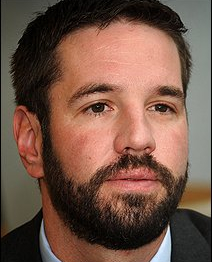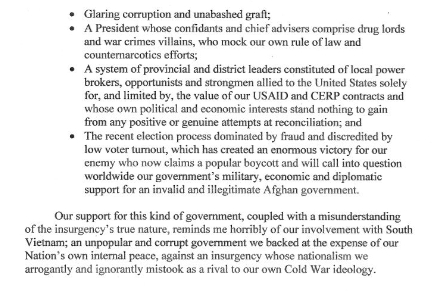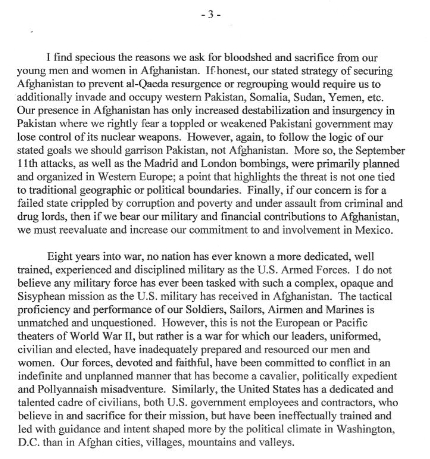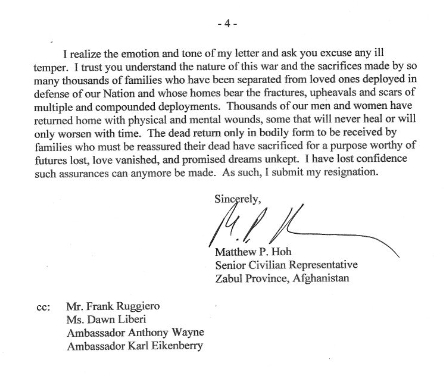
A U.S. official in Afghanistan has resigned in protest over U.S. policy in the war-torn region, as the Obama administration deliberates its future strategy there.
Matthew Hoh, 36, a senior foreign service officer, wrote a four-page letter to Ambassador Nancy Powell, director general of the foreign service at the State Department, to express his “doubts and reservations about our current strategy and planned future strategy,” as first reported by the Washington Post today.
“To put simply, I fail to see the value or the worth in the continued U.S. casualties or expenditures of resources in support of the Afghan government in what is, truly, a 35-year-old civil war,” the former Marine wrote in the emotional letter.
Hoh spent six years in Iraq, where he served as a Marine Corps captain and then as a civilian for the Department of Defense.
Hoh told the Washington Post he decided to speak out publicly because “I want people in Iowa, people in Arkansas, people in Arizona, to call their congressman and say, ‘Listen, I don’t think this is right.'”
The U.S. ambassador in Afghanistan, Karl W. Eikenberry, and Richard Holbrooke, the special representative for Afghanistan and Pakistan, apparently tried to talk Hoh out of resigning. The latter even offered him a job but Hoh declined, according to the Post.
Hoh’s resignation comes as a blow to the Obama administration, which has yet to decide whether it will send more U.S. troops to Afghanistan, as the lead commander on the ground, Gen. Stanley McChrystal, has requested.
Speaking at the Naval Base in Jacksonville, Fla., Monday, President Barack Obama stressed the importance of the issue and explained why, despite some criticism, he’s taking his time to decide.
“I will never rush the solemn decision of sending you into harm’s way,” the president told servicemen and women. “I won’t risk your lives unless it is absolutely necessary. And, if it is necessary, we will back you up to the hilt. Because you deserve the strategy, the clear mission, the defined goals and the equipment and support you need to get the job done.”
The president also acknowledged the challenges that lie ahead in the region.
Fourteen Americans died Monday in three helicopter crashes, with one involved in anti-drug operations, making it the deadliest day for U.S. casualties in Afghanistan in four years.
Administration officials will likely pay close attention to Hoh’s letter, in which he says that even if the United States increased its commitment to the region, it would take years — if not decades and generations — and billions of dollars to achieve success. He also argues that the U.S. military presence contributes to the legitimacy of the insurgency, led by ethnic Pashtuns.
It is also a message that is likely to reverberate with troops on the ground. Many of them have told ABC News they do not believe they are in greater danger than during the Bush administration, but that morale is an issue and they want Obama to make a decision quickly.
The president will wait until after the run-off presidential election in Afghanistan Nov. 7, some analysts said.
An ABC News/Washington Post poll released last week showed that 31 percent of Americans believe Obama has a clear plan for dealing with the situation in Afghanistan, while 63 percent think he does not.
And Americans’ view of the war in Afghanistan may not be very far off from that of Hoh’s. Nearly half of Americans surveyed, 47 percent, said the war has not been worth fighting, and 49 percent say more troops should not be deployed to Afghanistan.
Sen. John Kerry, D-Mass., who is complimented with giving Afghanistan’s President Hamid Karzai the push to accept a run-off election, said Monday that the U.S. mission should be more narrow and modest rather than the far-reaching, counter-insurgency strategy McChrystal has suggested.
“The nature of our commitment has to evolve away from U.S. military-dominated effort toward support for Afghan institutions and Afghan answers,” Kerry said in the speech at the Council on Foreign Relations. “We need to ask ourselves at every turn, will what we do, will this help the Afghan people take responsibility for their country? And if the answer is ‘no,’ we probably shouldn’t be doing it.”
Letter of Matthew Hoh to Ambassador Nancy Powell, Director General of the Foreign Service at the State Department.






